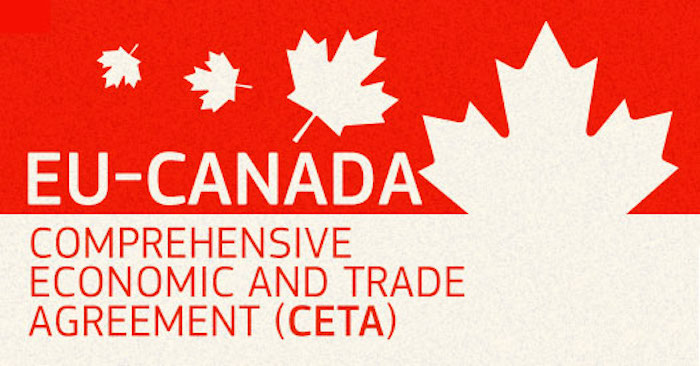The European Commission has insisted the new EU-Canada global trade deal will not compromise the EU’s standards of production or allow in lower standard imports.
The European Parliament this week voted in favour of the Comprehensive Economic and Trade Agreement between the EU and Canada (CETA) which could now come into force as early as this spring.
The deal removes almost 99% of tariffs currently affecting trade between the two countries, in most cases as soon as the deal comes into effect.
Tariff barriers will not be removed on certain agricultural products, for example, dairy, poultry and eggs, although there does not appear to be mention of pork.
Canada will eliminate duties worth €400 million for goods originating in the EU on the first day of its implementation, according to the Commission.
Brussels insisted the deal created ‘new opportunities for farmers and food producers, while fully protecting the sensitivities of the EU’.
It said the EU’s openings on certain products are ‘limited and calibrated and are balanced out by Canadian openings that satisfy important European exporting interests’.
Canada has agreed to protect 143 ‘distinctive’ agricultural food and drink products from specific geographical regions in the EU, ranging from Roquefort cheese, to balsamic vinegar from Modena and Dutch Gouda cheese.
They will be protected from imitations at a level comparable to EU law and will avoid the risk of being considered generic in Canada.
But in its response to the deal, the Commission has repeatedly to reassure the EU food sector and consumers that the deal will not pave the way for lower standard imports, a major concern for the pig sector, not just here, but as the UK seeks to forge new post-Brexit trade deals.
Import standards
The Commission said: “All imports from Canada have to satisfy EU rules and regulations. For example, only hormone-free meat will ever be imported into the EU.”
It added: “Free trade does not mean lowering or changing EU standards that protect people’s health and safety, social rights, their rights as consumers or the environment.
“These standards will remain untouched, and imports from Canada will have to satisfy all EU product rules and regulations – without exception. This means that CETA will not change the way the EU regulates food safety, including on GMO products or the ban on hormone-treated beef.”
The deal was approved by 408 votes to 254, with 33 abstentions in the European Parliament in Strasbourg.
“By adopting CETA, we chose openness and growth and high standards over protectionism and stagnation,” Parliament’s rapporteur for the CETA agreement Artis Pabriks (EPP, LV) said.
European Commission president Jean-Claude Juncker said: “EU companies and citizens will start to reap the benefits that the agreement offers as soon as possible.”




